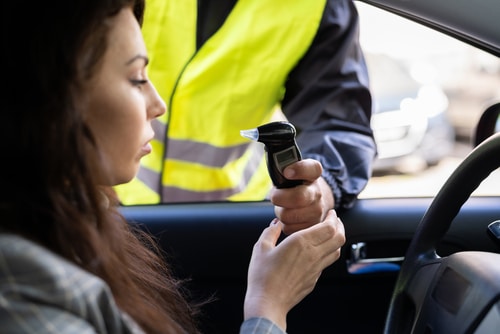When the police pull someone over on suspicion of drunk driving in South Carolina, they will usually ask for a breath sample. Most people will consent to a breath test—either because they know they are required to do so under South Carolina’s “implied consent” law or because they are too scared to say “No.”
But, what if you refuse?
If you refuse a breath test, can prosecutors still prove you were driving drunk? Or, do they need a blood alcohol concentration (BAC) reading to convict you? Unfortunately, not only can you still face a DUI conviction, but you can face an additional conviction for your “implied consent” violation.
How Prosecutors Can Prove Drunk Driving Without a BAC Reading
In some states, the police can force you to provide a blood sample if you refuse to take a breath test on the side of the road. But, this isn’t the case in South Carolina. Just as the police cannot force you to blow into the breathalyzer device, they cannot force you to undergo a blood draw.
Even so, prosecutors don’t need a breath sample or a blood sample to prove that you were drunk behind the wheel. This is due to the specific language of South Carolina’s drunk driving statute.
South Carolina’s drunk driving statute establishes two separate offenses. One of these offenses, driving with an unlawful alcohol concentration (DUAC), requires proof of your BAC. This section of South Carolina’s DUI law states:
“It is unlawful for a person to drive a motor vehicle within this State while his alcohol concentration is eight one-hundredths of one percent or more.”
Under the DUAC law, if your BAC is 0.08% or above, this is all it takes for prosecutors to secure a conviction. If the police obtain a valid BAC reading without violating your constitutional rights, avoiding a DUAC conviction can be very challenging—and negotiating a plea bargain may be your best option.
The other offense established under South Carolina’s drunk driving statute does not require proof of your BAC.
Instead, the offense of operating a motor vehicle while under the influence (commonly referred to as DUI) focuses on your behavior behind the wheel. This section of South Carolina’s drunk driving statute states:
“It is unlawful for a person to drive a motor vehicle within this State while under the influence of alcohol to the extent that the person’s faculties to drive a motor vehicle are materially and appreciably impaired . . . .”
As you can see, nothing here requires evidence that your BAC was 0.08% or above. If prosecutors can prove that your ability to drive was “materially and appreciably impaired” due to your consumption of alcohol, this alone is enough to prove a DUI.
As a result, while refusing a breath test might prevent the State of South Carolina from prosecuting you for DUAC, it won’t protect you against prosecution for DUI. Since the penalties for DUAC and DUI are the same, this means that you can face the same consequences regardless of whether you consent to a breath test on the side of the road.
With that said, there are some additional factors to consider. These include:
1. If You Refuse a Breath Test, You Can Be Charged with an Implied Consent Violation
Under South Carolina’s “implied consent” law, you are required to take a breath test when the police pull you over for drunk driving. While the police need to meet certain requirements before the law applies, they are trained to meet these requirements—and they will do so in most (but not all) cases.
If the “implied consent” law applies and you refuse a breath test, you can be charged with an “implied consent” violation. You can be convicted of an “implied consent” violation regardless of whether you were driving drunk—and, if you are convicted, you can face a minimum six-month driver’s license suspension unless you enroll in South Carolina’s Ignition Interlock Device Program.
2. If You Refuse a Breath Test, Prosecutors May Not Have the Evidence They Need to Prove DUI
While prosecutors can pursue a DUI charge without evidence of your BAC, in order to do so, they need evidence that your driving faculties were “materially and appreciably impaired.” While this evidence can take many forms—from dash camera footage of your vehicle on the road to the arresting officer’s testimony regarding your slurred speech and bloodshot eyes, there are several potential ways to defend against a DUI charge in South Carolina state court.
However, refusing a breath test has another important consequence: Under South Carolina’s “implied consent” law, prosecutors can use your refusal against you in court. In other words, they can present your refusal as evidence that you knew you were drunk behind the wheel.
3. In All Cases, Determining What Defenses You Have Available Requires Experienced Legal Representation
As you can see, there are several important (and complicated) issues involved in defending against a drunk driving charge in South Carolina. If you refused a breath test during your DUI stop, you should speak with a lawyer promptly.
An experienced South Carolina DUI lawyer will be able to examine the facts of your case to determine if the arresting officer took the steps necessary to trigger South Carolina’s “implied consent” law. If not, your lawyer can use this in your defense. If so, your lawyer can determine what other options you have available. Even if you cannot avoid penalties entirely, your lawyer can still help ensure that the consequences of your drunk driving arrest are no greater than necessary.
Speak with a South Carolina DUI Lawyer in Rock Hill for Free
If you need to know more about your options after refusing a breath test during a DUI stop in South Carolina, we encourage you to get in touch. To schedule a free and confidential consultation with an experienced South Carolina DUI lawyer in Rock Hill, call 803-328-8822 or request an appointment online today.

